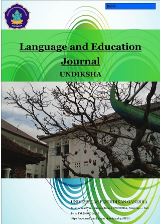STUDENTS’ PERCEPTION ON GOOGLE CLASSROOM ASSISTED LEARNING IN LIMITED FACE-TO-FACE INSTRUCTIONS DURING THE PANDEMIC
Keywords:
Students’ perception, Google Classroom, English LearningAbstract
This study aimed to identify and analyze the students’ perception toward the use of Google Classroom in English online learning. The investigation of the students’ perception becomes necessary since it can be used as a consideration for school on whether to keep using Google Classroom to facilitate face-to-face learning or not to use it at all. This research was designed using the Mixed Method research where the Descriptive Quantitative Data were dominant, while the qualitative data were used as the data supportive. Data were collected through two instruments namely a questionnaire and an interview guide. SMP N 1 Kubutambahan was chosen as the research setting and 63 students were selected as the research subjects. The results showed that the mean score of the data was 3.64. This indicated that the students of SMP N 1 Kubutambahan had a positive perception towards Google Classroom-assisted learning. Based on the interview data, the majority of students had a positive perception towards Google Classroom-assisted learning. Despite the difficulty, the majority of students wanted to continue using Goggle Classroom to assist the learning process.
References
Al-Maroof, R. A. S., & Al-Emran, M. (2018). Students acceptance of google classroom: An exploratory study using PLS-SEM approach. International Journal of Emerging Technologies in Learning, 13(6), 112–123. https://doi.org/10.3991/ijet.v13i06.8275
Alim, N., Linda, W., Gunawan, F., & Saad, M. S. M. (2019). The effectiveness of Google classroom as an instructional media: A case of state islamic institute of Kendari, Indonesia. Humanities and Social Sciences Reviews, 7(2), 240–246. https://doi.org/10.18510/hssr.2019.7227
Ari, N. P. J. (2021). Students’ Perception on the use of Google Classroom in Teaching and Learning during Pandemic of Covid-19. Journal of Educational Study, 1(2), 37–44. https://doi.org/10.36663/joes.v1i2.178
Astuti, N. W. (2021). “I Feel Less Judged, so I Speak More” Introverted Students’ Response on Online Learning Platforms in Speaking Class. JETLe (Journal of English Language Teaching and Learning), 2(2), 8–14.
Basaran, U. (2016). Examining the Relationships of Cognitive, Affective, and Conative Destination Image: A Research on Safranbolu, Turkey. International Business Research, 9(5), 164.
Chowdhury, S. K., & Salam, M. (2015). Predicting attitude based on cognitive, affective and conative Components : An online shopping perspective. Stamford Journal of Business Studies, 6/7(II/I), 101–115.
Cresswell, J. W. (2012). Educational Research. Pearson.
Čvirik, M. (2020). The Cognitive , Affective and Conative Components of Consumer Behaviour in the Context of Country of Origin : A Case of Slovakia. Central and Eastern Europe InThe Changing Business Environment, January, 23–33. https://doi.org/10.18267/pr.2020.cer.2395.3
Duraku, Z. H., & Hoxha, L. (2020). The impact of COVID-19 on education and on the well- being of teachers, parents, and students: Challenges related to remote (online) learning and opportunities for advancing the quality of education. In Impact of the COVID-19 Pandemic on Education and Wellbeing (pp. 17–45). University of Prishtina “Hasan Prishtina” Faculty of Philosophy.
Harjanto, A. S., & Sumarni, S. (2019). Teacher’s Experiences on The Use of Google Classroom. 3rd English Language and Literature International Conference (ELLiC), 3, 172–178.
Hrastinski, S. (2008). Asynchronous and Synchronous E-Learning. Educause Quaterly, 4, 51–55.
Jumroh, J., English, O. R.-I. J. of, & 2019, undefined. (2019). the Influence of Student’S Perception on Learning Media and Student’S Motivation Toward Student’S English Achievement. Journal.Lppmunindra.Ac.Id, 2(1), 1–10.
Mairing, J. P., Sidabutar, R., Lada, E. Y., & Aritonang, H. (2021). Synchronous and asynchronous online learning of advanced statistics during Covid-19 pandemic. Journal of Research and Advances in Mathematics Education, 6(3),
Mardiana, H. (2020). Lecturers’ Adaptability To Technological Change And Its Impact On The Teaching Process. JPI (Jurnal Pendidikan Indonesia), 9(2), 275. https://doi.org/10.23887/jpi-undiksha.v9i2.24595
Nurkancana, W. (1986). Evaluasi Pendidikan. Usaha Nasional.
Rukmana, G. W. (2021). Students’ Perception toward the Use of Google Classroom as Teaching and Learning English Media for EFL Students. Journal of Educational Study, 1(3), 191–199. https://doi.org/10.36663/joes.v1i3.167
Wahyuni, O. T. (2021). the Effects of Student ’ S Perception on Learning Technique and Learning Motivation on Students ’. INFERENCE: Journal of English Language Teaching, 4(2), 193–199.
Downloads
Published
How to Cite
Issue
Section
License
Copyright (c) 2022 Novita Febrianti, Ni Nyoman Padmadewi

This work is licensed under a Creative Commons Attribution-ShareAlike 4.0 International License.










